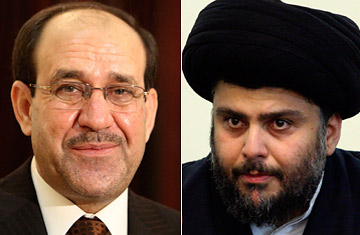
Iraqi Prime Minister Nouri al-Maliki, left, and Shi'ite cleric Muqtada al-Sadr
On the face of it, the decision by firebrand Shi'ite cleric Muqtada al-Sadr to back Nouri al-Maliki's staying on as Prime Minister ends the six-month political stalemate in Baghdad. But for anyone who has followed Iraqi politics since the country's first post-Saddam election, in 2004, the al-Sadr–al-Maliki alliance has disaster written all over it. The notoriously mercurial al-Sadr backed al-Maliki as Prime Minister in 2006 but quickly withdrew his support over an assortment of perceived slights. And after al-Maliki cracked down on al-Sadr's lawless militia, the Mahdi Army, the Shi'ite radical whose party won a kingmaker's share of this year's vote vowed that he would not back another al-Maliki term.
Al-Sadr has over the years flirted with numerous partnerships with Shi'ite and Sunni groups alike, but none has lasted long enough to make any impact on the political landscape. On Thursday, Sept. 30, the day before Iraq set a world record for a parliamentary system's delay between election day and the creation of a new government, al-Sadr finally reversed himself and accepted a new term for al-Maliki, whom his spokesmen have routinely denounced as an American puppet and worse. Al-Maliki's proxies, meanwhile, have portrayed the Sadrists as the lunatic fringe of Iraqi politics.
Abrupt changes of heart do happen in politics, and proportional-representation parliamentary systems routinely produce strange political bedfellows. But given the rancor between al-Maliki and the Sadrists, it's hard to imagine their coalition lasting very long. It's not yet clear what concessions al-Maliki has promised the Sadrists in exchange for their support, but they will no doubt include several Cabinet positions. The last time the cleric's nominees held national office (in al-Maliki's '06 Cabinet), they were incompetent even by Iraqi standards. The scariest rumor in Baghdad tonight is that al-Sadr has demanded one of the two Security Ministries: Defense or Interior. The prospect of a representative from the Mahdi Army, notorious for its sectarian violence against Sunnis, overseeing either the Iraqi military or its police force will hardly reassure the Obama Administration, which has been pushing hard for an end to the political stalemate in Baghdad but also seeks stability. This may be a case of being careful what you wish for: al-Sadr is vehemently anti-American and has drawn close to Iran since he moved to the holy city of Qom in 2007, apparently to pursue religious studies that will eventually make him an ayatullah.
Even if al-Maliki keeps the Security Ministries out of Sadrist hands, government forces will be expected to allow the Mahdi Army a wide berth — a prospect that will alarm those who have been at the receiving end of the militia's depredations. But given Sadr's penchant for brinkmanship, it's a safe bet he will ask for more than his rightful share: like the proverbial camel, he will seek to occupy the entire tent.
None of this will be lost on the Kurdish bloc, whose endorsement al-Maliki will need — even with al-Sadr's support — to achieve a majority. If the Kurds go along with the al-Maliki–al-Sadr pact, they will extract concessions of their own.
The Sunnis, most of whom backed former Prime Minister Iyad Allawi, will feel cheated if they don't get a share of power too; after all, Allawi won two seats more than al-Maliki, only to be shut out by the pact between the Shi'ite parties. Already there's talk of some Sunnis switching camps, if they can (you've guessed it) get some sweeteners from al-Maliki.
So the horse trading is far from over.
